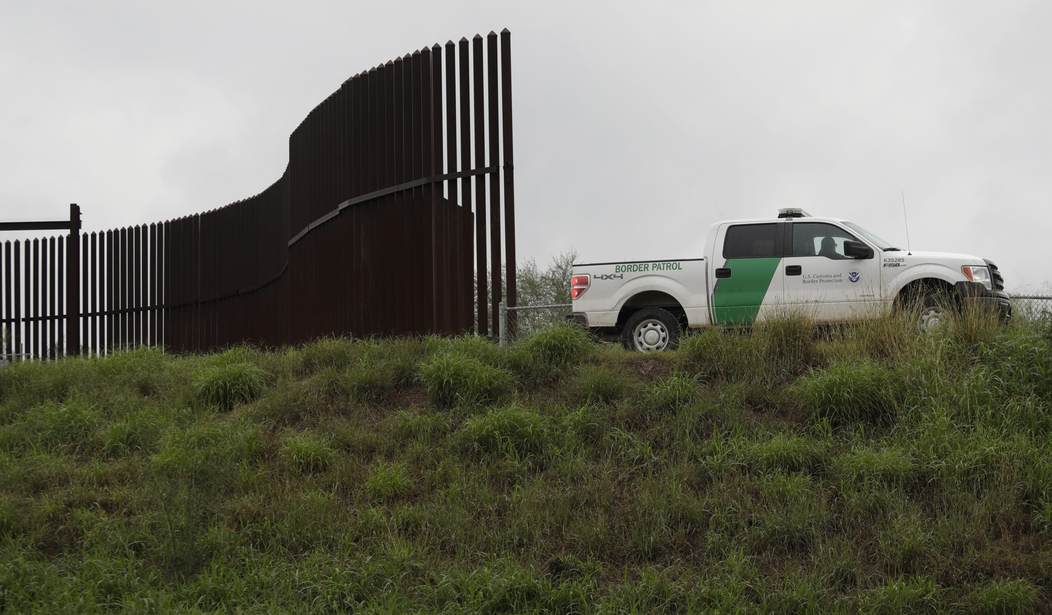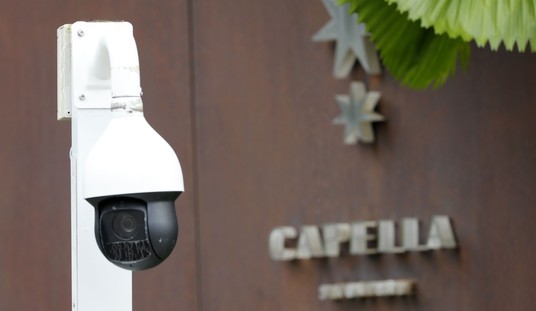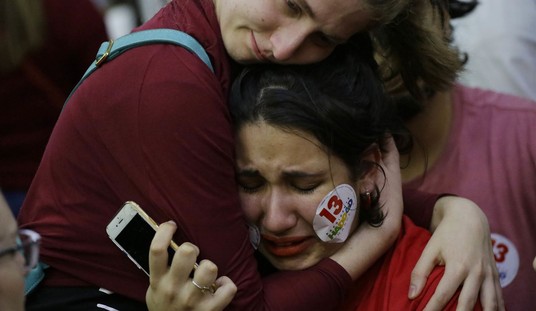House Homeland Security Chairman Michael McCaul (R-Texas) said it’s “hard to know exactly what the president wants” in terms of constructing a wall on the U.S.-Mexico border.
“It’s modified to a wall with slits so you can see the other side, which is what Border Patrol wants, to a 40-foot concrete wall with solar panels on it. It seems to change, and so the border security bill I’ll be introducing before the end of this Congress calls really for three things – physical infrastructure, which includes concrete levees, fencing; technology, I think is one of the key elements down there, most cost-effective efficient ways to get this done; and then additional personnel to respond to that threat,” McCaul said during a recent panel discussion at the Aspen Security Forum. “We will be authorizing the secretary with broad powers to do that. I’m not going to micromanage them and tell them where to do it or how exactly to do it.”
The moderator jumped in, saying, “But a full physical wall on the entire border is just not going to happen.”
McCaul responded, “Well, you know, we’re from a state that has a river; it’s hard to envision how you could structurally do that.”
McCaul said a physical wall works in some parts of the 2,000-mile southwest border.
“The concrete levees work well. It’s flood protection; the communities like that. In well-populated areas physical barricades work, and in between there technology seems to be more effective,” he said.
McCaul said the various forms of barriers along the border must be “integrated by technology,” which is not being done now.
“That’s why it’s not being effective. Now, having said that, the rhetoric and the deportations have brought the crossings down by 70 percent, but we do have to reinforce the border. I think the secretary mentioned one of the greatest threats that we have is the human and drug trafficking coming into the United States and the potential terrorists that are linked to transnational criminal organizations,” he said.
The moderator asked the lawmakers on the panel if America’s “standing in the world is stronger, weaker or about the same” since President Trump took office.
House Armed Services Chairman Mac Thornberry (R-Texas) said it’s too soon to make a determination.
“My temptation is to say ‘too early to say,’ although I think we’re on a positive trajectory partly because of what we’ve been doing,” he said.
In his response to the same question, House Intelligence Committee Ranking Member Adam Schiff (D-Calif.) mentioned Trump’s decision to withdraw from the Paris climate accord.
“I think when we walked out of the Paris climate accords we renounced a significant part of our leadership of the world. And the most troubling headline I’ve seen during the Trump presidency was when [German Chancellor] Angela Merkel came to visit Washington the first time and the headline – and this was before the Paris agreement withdrawal – the headline was ‘leader of the free world meets Donald Trump,’ and to me that was a horribly painful, poignant headline,” he said.
“So, you know, my reluctant conclusion is yes and not irremediably so, but one last point for a very long one-word answer: I found it so striking that second meeting the president had with Putin, because here he left sitting next to the Japanese Prime Minister to go sit next to the Vladimir Putin [at a G-20 dinner],” Schiff added. “And when I thought about that image, I thought these are now two of the most isolated leaders in the world and no wonder they have common interests – and that is not a position the United States should be in.”
Rep. Stephanie Murphy (D-Fla.) referenced comments she has heard from U.S. allies.
“When we talked to European leaders at the Shangri-La dialogue, they expressed the concern to us that the United States would sell out European countries for a closer relationship with Russia. When we talked to Asian partners and allies, they expressed the concern that the United States would sell out Asian countries for a closer relationship with China,” she said. “I think when you’re listening to what your partners and allies are telling you, it’s hard to come to the conclusion that America is stronger than where we were.”
McCaul praised Trump’s “unpredictable” approach to foreign affairs as an asset.
“I think he’s put a great national security team together and that’s the one thing that gives me great confidence. I think his meeting in Saudi and his speech was one of his best, I think, in reassuring NATO when he gave that speech. And so harkening back to the previous administration, not to get too political, but I felt like our allies no longer trusted us and our enemies no longer feared us,” he said.
“The one thing about Trump is I think he’s so unpredictable, like the strike in Syria when the Chinese president is sitting next to him, that there is some value to that. And I think the model of leading as a superpower rather than retreating from the world and creating so many hot spots, I think that doctrine of strategic patience is over under this administration,” McCaul added.
The moderator asked each of the lawmakers if they would have taken the Trump Tower meeting that Donald Trump Jr., Paul Manafort and Jared Kushner attended with a Russian lawyer, a Russian lobbyist and others during the 2016 campaign under the promise of damaging information on Hillary Clinton.
“It’s a tough question. I think you obviously want to know all the information out there, but I think the optics of meeting with a foreign adversary or an agent of a foreign power or a lawyer who may have been a Russian intelligence operative creates a not only legal sort of issue but a political optics issue,” McCaul said. “And just knowing what Russia has done in the past, what they did in our elections, the question is that meeting that you’re referring to, were they sort of duped by the Russians or was this more of a collusion type of event?”
When pressed, McCaul replied, “I’d have my campaign manager do it or maybe my oppo research guy. No I think there would probably be other ways to get that information without sitting down with someone that is that radioactive.”
Murphy expressed a different point of view than McCaul, saying she would “probably call somebody like the FBI” and could not “imagine” taking the meeting.
“When I worked at the Department of Defense I filled out the SF-86, I waited a long time to get my TS/SCI (Top Secret/Sensitive Compartmented Information). I’ve been trained on counterintel methods. I understand the importance of reporting when you do have contact with foreign nationals, especially ones that are hostile to the United States,” Murphy said. “So I think my radar is a bit more up than my colleague, but what I will say about this coming election is that I want to run a race against a fellow American about issues that matter to my district, not run a campaign against Russian misinformation. I think it’s a really dangerous thing when we allow an external foreign force into meddling in our democracy.”
Schiff said he would call the FBI immediately and not take the meeting. He recalled a meeting he had with the Russian ambassador about a decade ago as a member of the Foreign Affairs Committee.
“What I did is I called the Capitol Police and they came and they swept my office for bugs. Now this I think predated my service on the Intelligence Committee, but nonetheless not only I but the Capitol Police had enough skepticism about Russian intentions to know that we needed to make sure that the visitor did not leave anything behind,” he said.
Thornberry said Russia’s actions in the last election cycle were intended to distract the U.S. from other issues and “we fall for it.”
“I’m old school when it comes to Russia kind of like [former Director of National Intelligence James] Clapper so I’d call the FBI; I don’t trust them as far as I could throw them. What I worry about is, and that goes back to the word you used in your question, and that it is the drama. This is so much drama that occupies us – meanwhile, as we heard earlier today, the Russians are modernizing their nukes, they have counter-space capability, they are developing new weapons, they’re about to conduct big exercises in Belarus, they are doing all of these things and meanwhile we’re worried about the drama of who met who with whom,” he said.
“Part of our job as an independent branch of government is keep our eye on the ball – in this case, the threats that Russia poses to the national security of the United States – and don’t get so caught up in the drama that we lose sight of those things that Adam was just talking about and the broader Russian threat,” the chairman added.
Thornberry also said Russian officials “exploit opportunities.”
“We see this and yet we fall for it anyway. We better look at this broader picture because as [Chairman of the Joint Chiefs of Staff] General Dunford and others said this is at least the biggest threat to the national security of the United States,” he said.









Join the conversation as a VIP Member